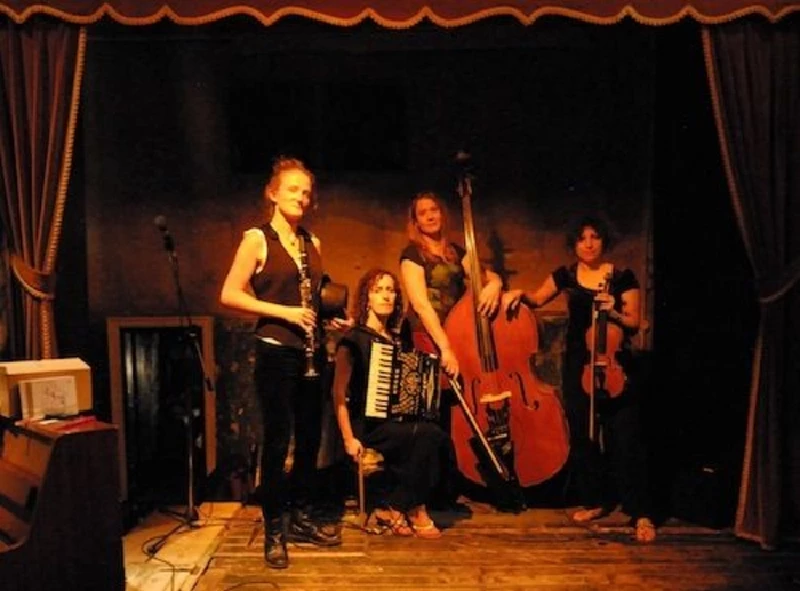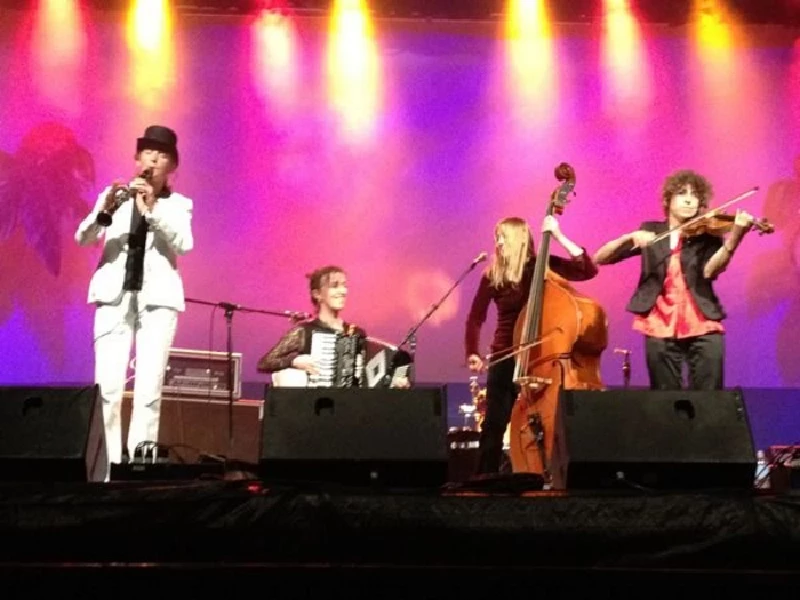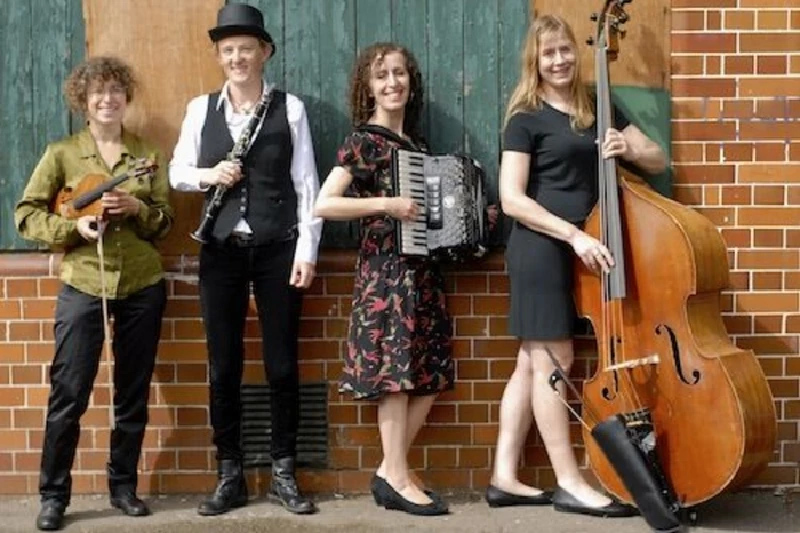London Klezmer Quartet - Interview
by Owen Peters
published: 8 / 3 / 2016

intro
Owen Peters speaks to violinist Ilana Cravitz from the London Klezmer Quartet about their Eastern European influences and musical background and its history
I find the beauty of live music not only offers the opportunity to be entertained but also to become immersed in new cultures, personalities and instrumentation all in one sitting. The London Klezmer Quartet provided such cocktail and diversification throughout a recent show at the Norden Arts Theatre in Maidenhead. The London Klezmer Quartet played with no background visuals or stage props, but they didn’t need them. Ilana Cravitz (violin) and Susi Evans (clarinet) took centre stage and did most of the introductions and audience chatter. Rupert Gillett (double bass) and Josh Middleton (accordion) provided a good balance and tempo to the quartet's set. Whilst I was playing catch up on the origins, history and tradition of Klezmer music, as the set progressed many in audience were way ahead of the game. References to “the Jewish Benny Goodman” brought an appreciative round of applause from the audience. Not everyone was on a learning curve at this gig. The London Klezmer Quartet dipped into traditional music from the Balkans to the Black Sea. After providing a stamping dance ('Honga') from Hungary, they went to downtown Brooklyn for 'The Flashbush Waltz'. They then switched to a wonderful rendition of Prokofiev’s 'Peter and the Wolf'. There was even a sing-a-long which turned into a cunning 'Happy Birthday' for an unsuspecting audience member. The quality of musicianship was outstanding, and the quartet's timing and rhythm never missed a beat. They threw in a splattering of humour, and just enough solo spots to mix up the set to cover something for everyone. The London Klezmer Quartet were entertaining, educational, funny, but above all they are top quality musicians, enjoying their music up close and personal with the audience. I tried during the interval to get a quick word with Llana and Susi who were manning the merchandise stall. I tried again after the show. They were covered in plaudits, sales and questions from an appreciative crowd. I’m sure I could have gained closer proximity to North Korea’s Kim Jong. In between gigs, Ilana Cravitz kindly put some time aside to tell Pennyblackmusic about the quartet and klezmer music. PB: For those readers who may be new to the London Klezmer Quartet , please introduce yourselves. IC: The London Klezmer Quartet was formed in 2009 by a group of klezmer specialists keen to explore the almost-lost wedding music tradition of Jewish Eastern Europe. Since then the band has expanded the repertoire, writing and performing tunes in the traditional style, as well as bringing old material back to life for audiences around the world. The London Klezmer Quartet has an acoustic line-up: clarinet, fiddle, accordion, with double bass and/or cello on the bottom line. Carol Isaacs (accordion), myself (violin) and Susi Evans (clarinet) originally worked with Francesca Ter-Berg (cello), bringing Indra Buraczewska (double bass and vocals) on board when we first toured in Australia and Fran was unable to join us. Since then things have moved on apace – we’ve discovered Indra’s amazing vocal talents, and she’s moved from Melbourne to her historical homeland of Latvia, which is a lot nearer to the rest of the band! We also work with bass player Rupert Gillett in the UK from time to time, and accordionist Josh Middleton. PB: Just so we are clear. What is klezmer? IC: The word klezmer literally means ‘vessel of song’ – it’s two words in Hebrew or Yiddish: kley and zemer. Originally the word was used to describe a professional Jewish folk musician. In the 1930s the term was coined by the Soviet Jewish ethno-musicologist Moyshe Beregovskii to describe the repertoire played by klezmorim (the plural of ‘klezmer’) in the Pale of Settlement – the area from the Baltic to the Black Sea that Jews were confined to from the early nineteenth century until the First World War. A number of Jewish musicians moved to the US and Europe in the early twentieth century as part of a wave of emigration to escape poverty and persecution; the vast majority of those left in Eastern Europe were murdered in the Holocaust. Nowadays the term ‘klezmer’ is used by groups that base their choice of music around traditional Jewish melodies. PB; There is clearly a huge amount of talent in the quartet. What is the quartet's background and musical education? IC: The background and musical education of the London Klezmer Quartet members is very varied. It’s safe to say that we’ve gained our most valuable training on the road. From Balkan, klezmer and modern music groups to pop acts, baroque ensembles, and folk bands, there’s a wealth of experience that informs the way we write and perform our music. We’ve all had ‘classical’ training to a more or less intense degree, and thank our parents for nurturing our musical talents! PB: Which artists have influenced the London Klezmer Quartet sound? IC: We’re most influenced by old recordings of klezmer musicians from the first half of the twentieth century, mainly from the US but also some rare gems recorded in Europe: clarinet players including the late great Naftule Brandwein; Dave Tarras (‘the Jewish Benny Goodman’); and Belf with his famous ‘Romanian Orchestra’ of three. There are also some awesome violinists, including H. Steiner, Josef Solinski, Jacob Gegna and Oscar Zehngut. Mishka Tsiganoff (literally ‘Michael the Gypsy’) was an accordion player who recorded a lot of Jewish music with very authentic ornamentation. We also love the recordings of klezmer kapelyes (ensembles), including the many directed and recorded by Abe Schwartz, himself a fiddler, which featured the cream of the American klezmer scene, many of whom who had emigrated to the US direct from Eastern Europe. YouTube’s ‘Classic Klezmer’ channel features many recordings from these artists – klezmer gold! PB: Besides playing live and recording albums, the London Klezmer Quartet is also involved with schools, hospitals etc through your music. Would you explain in more detail? IC: We’re very proud to have been selected to represent the organisation's Music in Hospitals and Breathe Arts Health Research in their outreach programmes. We’ve played in many different therapeutic environments, including care homes, dementia and mental health wards, hospices, special schools and brain trauma units. It’s remarkable and rewarding to see people’s reactions to music; it brings home the unique way music reaches and benefits people. We are also very proactive in working with young people to help them enjoy making, listening to, and appreciating music, and have been into dozens of schools.PB: Do you have any new (2016) year resolutions which haven't yet been broken? IC: The London Klezmer Quartet’s motto: "The best way not to break a new year's resolution is not to make one in the first place!" PB: Talking of 2016 what have you lined up in terms of gigs, festivals and recordings? IC: We’re planning to record our fourth album in late March with a tour in the winter. There’s UK travel on the horizon and we’re working on some European dates, as well as thinking ahead to another Australian foray early next year. Keep an eye on www.londonklezmerquartet.com to see the year as it unfolds! PB: Thank you.
Band Links:-
http://www.londonklezmerquartet.com/https://www.facebook.com/LondonKlezmerQuartet/
http://www.songkick.com/artists/3793186-london-klezmer-quartet
https://www.youtube.com/channel/UCyzTcfCv7aqcXs1DncrMeNg
Picture Gallery:-


soundcloud
most viewed articles
current edition
Carl Ewens - David Bowie 1964 to 1982 On Track: Every Album, Every SongEditorial - July 2025
Billie Eilish - O2 Arena, London, 10/7/2025
Visor Fest - Valencia, Spain, 26/9/2025...27/9/2025
Hothouse Flowers - Photoscapes
Bathers - Photoscapes 2
Bathers - Photoscapes 1
John McKay - Interview
Colin Blunstone - Thalia Hall, Chicago, 16/7/2025
Cleo Laine - 1927-2025
previous editions
Heavenly - P.U.N.K. Girl EPBeautiful South - Ten Songs That Made Me Love...
Trudie Myerscough-Harris - Interview
Pixies - Ten Songs That Made Me Love...
Boomtown Rats - Ten Songs That Made Me Love....
Fall - Hex Enduction Hour
Sam Brown - Interview Part 2
Doris Brendel - Interview
Blues and Gospel Train - Manchester, 7th May 1964
Donovan - Ten Songs That Made Me Love...
most viewed reviews
current edition
Sick Man of Europe - The Sick Man of EuropeAmy Macdonald - Is This What You've Been Waiting For?
Phew, Erika Kobayashi,, Dieter Moebius - Radium Girls
Alice Cooper - The Revenge of Alice Cooper
Blueboy - 2
Lucy Spraggan - Other Sides of the Moon
Cynthia Erivo - I Forgive You
Davey Woodward - Mumbo in the Jumbo
Philip Jeays - Victoria
Bush - I Beat Loneliness
Pennyblackmusic Regular Contributors
Adrian Janes
Amanda J. Window
Andrew Twambley
Anthony Dhanendran
Benjamin Howarth
Cila Warncke
Daniel Cressey
Darren Aston
Dastardly
Dave Goodwin
Denzil Watson
Dominic B. Simpson
Eoghan Lyng
Fiona Hutchings
Harry Sherriff
Helen Tipping
Jamie Rowland
John Clarkson
Julie Cruickshank
Kimberly Bright
Lisa Torem
Maarten Schiethart